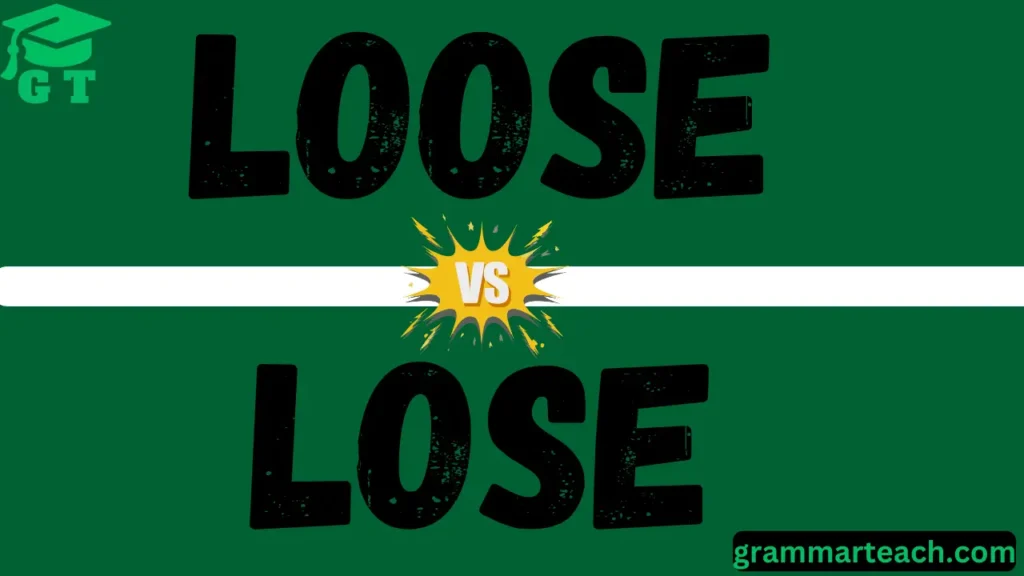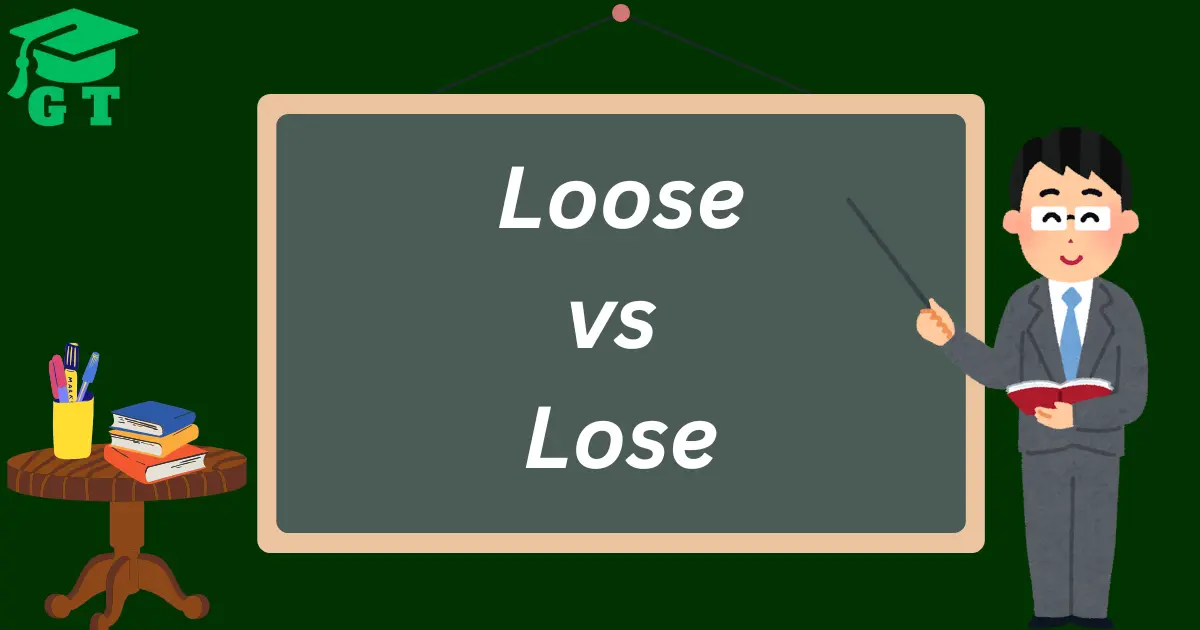Have you ever hesitated before typing “loose” or “lose”? You’re not alone! Many English speakers and writers often mix up these two words because they look similar but have entirely different meanings. The confusion between “loose vs lose” is common, but after reading this article, you will never mistake them again!
In this guide, we will explore their definitions, correct usage, key differences, and real-life examples. Plus, we’ve included tables to help you understand them better in a simple and easy-to-follow way.
Loose vs Lose – What’s the Difference?

Though they may appear similar, “loose” vs “lose” serve entirely different functions in the English language, and mixing them up can lead to confusion. These words are commonly misused due to their close spelling, but understanding their meanings will help you avoid mistakes in writing and speech.
The key difference is:
- Loose (with double ‘o’) is an adjective that means not tight, not firmly attached, or free from constraints.
- Lose (with a single ‘o’) is a verb that means to misplace something, to be deprived of something, or to fail in a competition or challenge.
For example, if your shoelaces are not tight, they are loose. However, if you cannot find your shoelaces, you might have lost them. Similarly, if a team does not win a game, they lose, but if their jerseys are oversized, they are loose.
To better understand these distinctions, let’s break down each word in more detail.
Read More: Than vs Then: Easy Guide to the Difference & Correct Use
What Does the Word “Loose” Mean?
Definition:
Loose is an adjective that describes something not firmly fixed in place, not tight, or not confined.
Usage in Sentences:
- My shoelaces are loose; I need to tie them.
- She wore a loose dress on a hot summer day.
- The screws on the door handle are loose and need tightening.
Contextual Usage:
- Used in both casual and formal speech.
- Common in fashion, mechanics, and everyday descriptions.
Characteristics of Loose
| Feature | Loose Meaning |
| Part of Speech | Adjective |
| Pronunciation | Rhymes with “moose” |
| Common Usage | Describing something not tight or free |
| Example | “The rope is too loose.” |
What Does the Word “Lose” Mean?
Definition:
Lose is a verb that means to be deprived of something, to misplace an item, or to fail in a competition.
Usage in Sentences:
- I always lose my keys in the house.
- Our team didn’t want to lose the championship game.
- If you don’t take care of your health, you might lose your strength.
Contextual Usage:
- Commonly used in sports, personal belongings, and life experiences.
- Appears frequently in both spoken and written language.
Characteristics of Lose
| Feature | Lose Meaning |
| Part of Speech | Verb |
| Pronunciation | Rhymes with “choose” |
| Common Usage | Describing an action where something is lost |
| Example | “Did you lose your phone?” |
Key Differences Between Loose and Lose
| Aspect | Loose | Lose |
| Definition | Not tight or free | Misplace or fail |
| Common Usage | Describes objects or states | Describes actions |
| Context | Fashion, mechanics, general descriptions | Sports, personal belongings, competitions |
| Grammar Role | Adjective | Verb |
| Common Mistakes | Writing “loose” when meaning “lose” | Writing “lose” when meaning “loose” |
Examples in Context
- Clothing: “My pants are too loose, so I need a belt.” (Adjective)
- Misplacing an Item: “Did you lose your phone again?” (Verb)
- Competition: “They don’t want to lose the match.” (Verb)
- Mechanical Issue: “The bolts on the chair are loose.” (Adjective)
Sentence Comparison Table
| Situation | Loose | Lose |
| Describing a shirt | “This shirt is too loose.” | Incorrect usage |
| Talking about a game | Incorrect usage | “We don’t want to lose the game.” |
| Describing shoelaces | “Your shoelaces are loose.” | Incorrect usage |
| Misplacing keys | Incorrect usage | “I always lose my keys.” |
Why Do People Confuse Loose and Lose?

- Similar Spelling – Both words contain the letters “l,” “o,” and “s.”
- Pronunciation Confusion – “Lose” rhymes with “choose,” whereas “loose” rhymes with “moose.”
- Typing Errors – Because “loose” has an extra “o,” it’s easy to mistakenly use it for “lose.”
Synonyms & Antonyms
| Word | Synonyms | Antonyms |
| Loose | Free, untied, slack | Tight, secure, fastened |
| Lose | Misplace, forfeit, fail | Find, win, gain |
Which One Should You Use? (Practical Tips for Writers)
- If you need a verb, the correct choice is lose (e.g., “I don’t want to lose my wallet”).
- If you need an adjective, go with loose (e.g., “These pants are too loose”).
- Trick to Remember: “Loose” has double ‘o’, just like “moose” (which is big and free). “Lose” has one ‘o’, just like “win” (opposite meanings).
Additional Learning Resources
If you want to practice more, try these exercises:
- Fill in the blanks:
- I don’t want to ____ my job. (lose)
- My dog got ____ and ran away. (loose)
- Don’t ____ your phone again! (lose)
- The lid on the jar is too ____. (loose)
- Correct the mistakes:
- “I always loose my glasses.” → “I always lose my glasses.”
- “Her dress was lose and flowing.” → “Her dress was loose and flowing.”
Read More: Coach vs Couch: What’s the Difference? Easy Guide & Examples
Final Thoughts
Understanding the difference between “loose” and “lose” is essential for clear and accurate communication. “Loose” is an adjective that describes something not tight or free, while “lose” is a verb meaning to misplace something or be deprived of it. These words are often confused due to their similar spelling and pronunciation, but with practice, you can easily remember which one to use in different situations.
Next time you are unsure, remember this simple trick: “Loose” has double “o,” just like “moose,” which is free and untamed, while “lose” has a single “o,” just like “win”—its opposite. Keeping these distinctions in mind will help improve your writing and prevent common mistakes!




